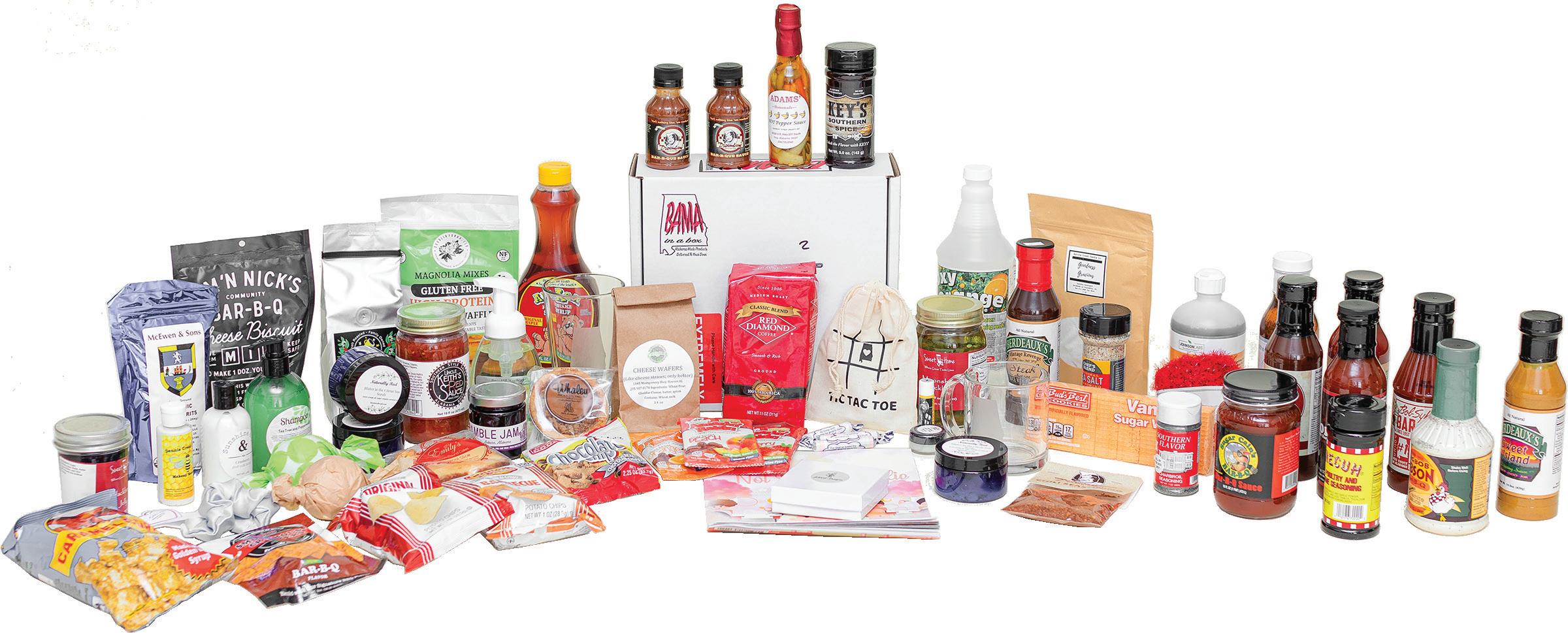
20 minute read
Around Alabama
Bellingrath Gardens and Home will celebrate the birthday of Walter D. Bellingrath, founder of the gardens, with an event on Aug. 6. PHOTO COURTESY BELLINGRATH GARDENS AND HOME
AUGUST
6Theodore Mr. Bellingrath’s Birthday Celebration at Bellingrath Gardens and Home. Walter D. Bellingrath was Mobile’s first Coca-Cola bottler and the founder of the Bellingrath Gardens and Home. In honor of his birthday, admission to the gardens is free to Mobile and Baldwin County residents on this date. Home tour tickets are $10 per person and are led by longtime guides. 251-9732217 or Bellingrath.org
6-7 Athens 29th annual Piney Chapel American Farm Heritage Days. The Piney Chapel Antique Engine and Tractor Association sponsors this family event at 20147 Elkton Road. $5 admission, 12 and under free. Friday features tractor rides and a fish fry; there will also be antique power and wheat threshing exhibits. Gates open at 7 a.m. Search for the group’s page on Facebook.
7Dothan Landmark Park Education Festival, 10 a.m. to 2 p.m. Teachers, youth group leaders and families are invited to a showcase of the educational opportunities available at Landmark Park. Activities will include planetarium shows, live animal programs, dulcimer lessons and more. Free with paid admission. 334-794-3452 or LandmarkParkDothan.com
13-14 Frisco City Monroe County NCPRA Rodeo, Frisco City Park. This family-friendly event is sanctioned by the National Cowboy Pro Rodeo Association. Tickets are $15 for ages 13 and older, $5 for ages 3-12, and children under 3 are free. Monroecountyal.com
26-Oct. 3
Guntersville “Water/Ways,” a traveling exhibit that explores the role that water plays in human society and culture and the importance of protecting this critical resource. The exhibit at the Guntersville Museum is made possible by a partnership between the Alabama Humanities Foundation and the Smithsonian Institution Museum’s Museum on Main Street program, which gives access to the Smithsonian for small-town America. Alabamahumanities.org
20-21 Russellville 40th annual Franklin County Watermelon Festival. Music, contests and entertainment, as well as arts and crafts, 5K run, antique car and truck show, festival foods, tractor show and of course watermelon. Follow the event’s pages on Instagram and Facebook.
21 Ardmore 29th annual Crape Myrtle Festival, 9 a.m. to 4 p.m., John Barnes Park in Ardmore, Tenn. Arts and crafts and other vendors, crape myrtle sale, food trucks, entertainment and more. Search for the event’s page on Facebook.
27-28 Decatur Riverfest 2021, Ingalls Harbor Pavilion and Event Center. Benefits Mosaic Mentoring of North Alabama, which serves children and families in north Alabama. Music concert featuring Parmalee and Jesse Priest Music at 5 p.m. Friday; $10 admission. Saturday features an SCA sanctioned steak cookoff; visit steakcookoffs. com for information on that event. MosaicNorthAl.org or 256-353-0157.
28 Foley Bacon and Brew Music Bash, Heritage Park. 10 a.m. to 7 p.m. Live music, food vendors, kids zone, contests with cash prizes, large variety of vendors and, of course, bacon. Live music by Almost Skynard and Wanted: The Bon Jovi Tribute Band. $5 entry fee; children 12 and under are free. Search for the event’s page on Facebook.
28 Montgomery fourth annual Hog Days of Summer BBQ and Music Festival, downtown at Union Station. Headliner is Robert Earl Keen, along with Cedric Burnside and Jupiter Coyote. Features barbecue from the River Region’s best restaurants. Proceeds go to help families dealing with pediatric cancer. $30 general admission, $25 for first responders and military, children 12 and under free. HogDays.org
28 Trussville Battle of the Bands at Trussville Civic Center, 5381 Trussville Clay Road. Free. Area bands compete to give everyone a good time. Food truck village and cash bar will be available. Search for the event’s page on Facebook.
SUMMER
Daviston Horseshoe Bend National Military Park will hold a series of free ranger talks on Wednesdays and Saturdays through Labor Day. Topics will cover the Creek War of 1813-14, the Battle of Horseshoe Bend, Muscogee (Creek) culture and history and more. All talks will begin at tour stop #2 and will begin at 2 p.m. Wednesdays and 10 a.m. and 2 p.m. Saturdays.
SEPTEMBER
4Arab Sugarfest, Arab City Park on Shoal Creek Trail NE. 9 a.m. to 9 p.m. This festival is organized by volunteers who work to promote culture and community. The marketplace will have vendors and food trucks; there will also be a 5K race, Miss Sugarfest pageant, a kids’ area with rides, carnival-themed games, a petting zoo and more. The pool and splash pad will be open free of charge. In the afternoon is a cornhole tournament, classic car show and outdoor concert; local acts begin at 4 p.m. Fireworks begin at 8:15 p.m. TheSugarfest.com
5-6 Cullman 25th annual Sweet Tater Festival at Smith Lake Park. 9 a.m. to 6 p.m. Sunday and 9 a.m. to 4 p.m. Monday. Arts and crafts vendors, food vendors, car show and of course, sweet potatoes. Admission $5; armbands are good for both days. SmithLakePark.com or 256-739-2916.
17-18 Fort Payne Boom Days annual festival. Downtown shopping, local artisans, family-friendly activities, gospel singing and live music acts Damon Johnson and the Get Ready as well as Aeromyth on Friday, and the Bellamy Brothers and headliner Sawyer Brown on Saturday. Free. Boomdays.com
Call or verify events before you make plans to attend. Due to the changing nature of the COVID-19 pandemic, some events may change or be canceled after press time.
More than a market
Ingram’s offers camp stew, ’cue, burgers and more
Story and photos by Jennifer Kornegay
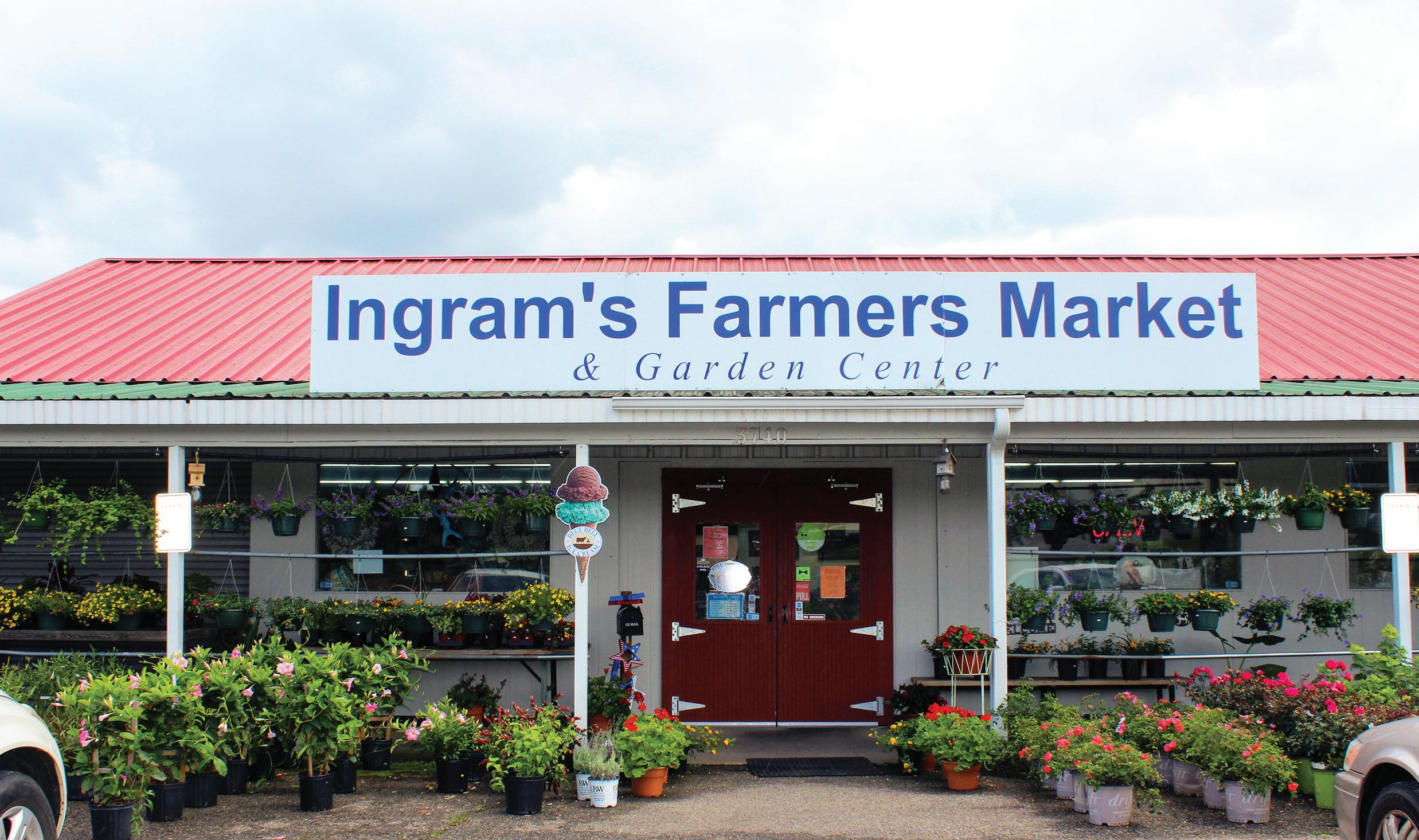
If you enjoy outfitting your yard and patio with healthy plants; if you value Alabama-made art and crafts; and if you prefer (and who doesn’t?) fresh fruits and veggies from nearby farms, then Ingram’s Farmers Market & Garden Center should be your go-to, one-stop shop for all of the above.
But plenty of people who neither want nor need produce, plants or pottery regularly file through Ingram’s front doors. They walk right past the piles of peaches and baskets of begonias and make a beeline for the back counter, eyes homed in on the chalkboard menu. They’re here for the food, and probably most of them, the barbecue.
In Millbrook, this multi-tasking market was a produce stand in the past, but when Mike and JoAnne Ingram bought it in 2018, they gave it a facelift and greatly expanded its offerings. Mike had sold a business he owned and entered the corporate world. But after a decade of that work, he missed the interaction he’d had with customers when he was a business owner. “I wanted to get back into making those personal connections,” he says. “And that’s what we’re doing here. I love talking to people, and Millbrook has been so supportive. It’s great. I love that they love our food.”
But the barbecue, burgers, camp stew and long list of dessert delights that have really put Ingram’s on the map didn’t come along until 2019, a year after opening, as JoAnne explains. “When I met Mike when we were students at Troy, he was already getting into barbecue, cooking for his fraternity’s fundraisers,” she says. Then, throughout his other career, when the couple lived in Union Springs, he continued volunteering his grill skills. “Doing barbecue to help groups raise money became a hobby for me,” Mike says. Even though he had been smoking ‘cue and cooking up big batches of camp stew for decades, JoAnne had to talk him into adding the kitchen and opening the restaurant at Ingram’s. “I really had to encourage him to do it,” she says. Today, they’re both glad, along with their loyal customers, that he listened. “The restaurant JoAnne and Mike Ingram, owners of Ingram’s Farmers Market and Garden part of it has been a whirlwind Center, are rightfully proud of Mike’s beef brisket, shown here. success,” JoAnne says. In 2020, they had to buy another grill and smoker to keep up with demand for the barbecue. It’s not hard to understand why. Almost everything on the menu is made from scratch in-house, including the divinity, key lime pie, red velvet cake and hummingbird cake make by baker Dawn Davis. The sides, like the light-and-fluffy potato salad
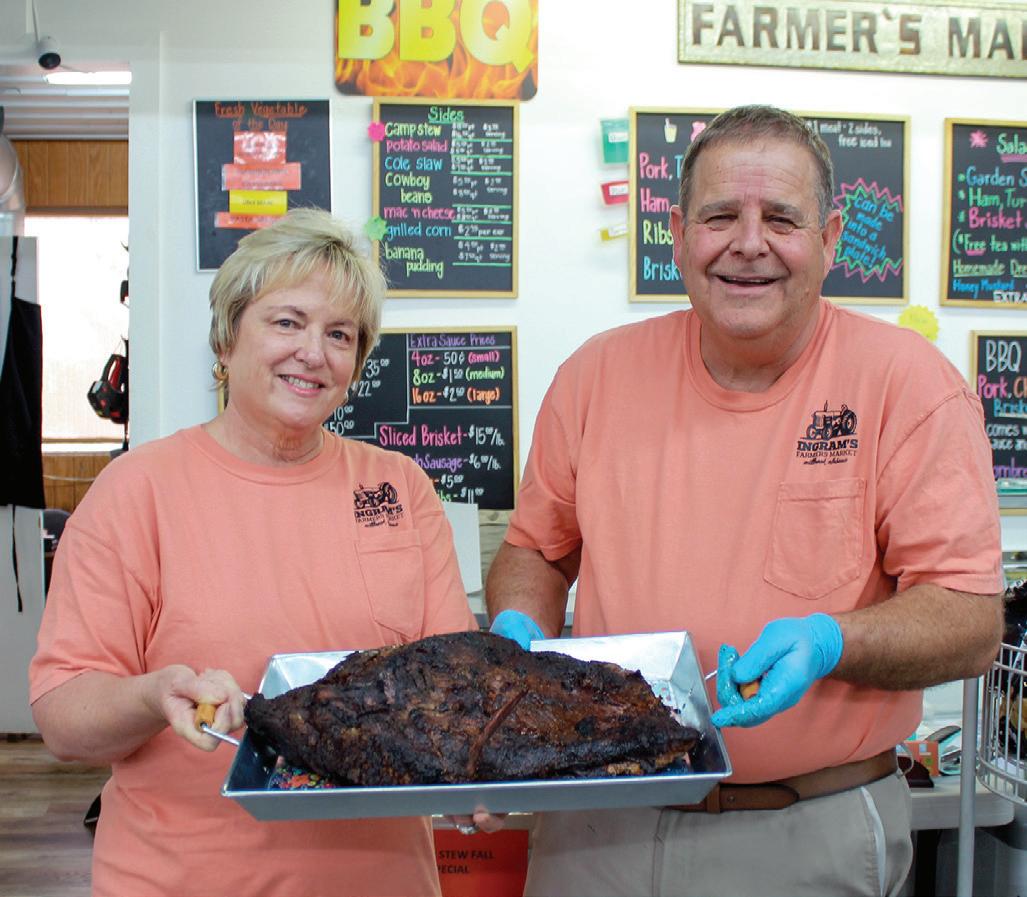

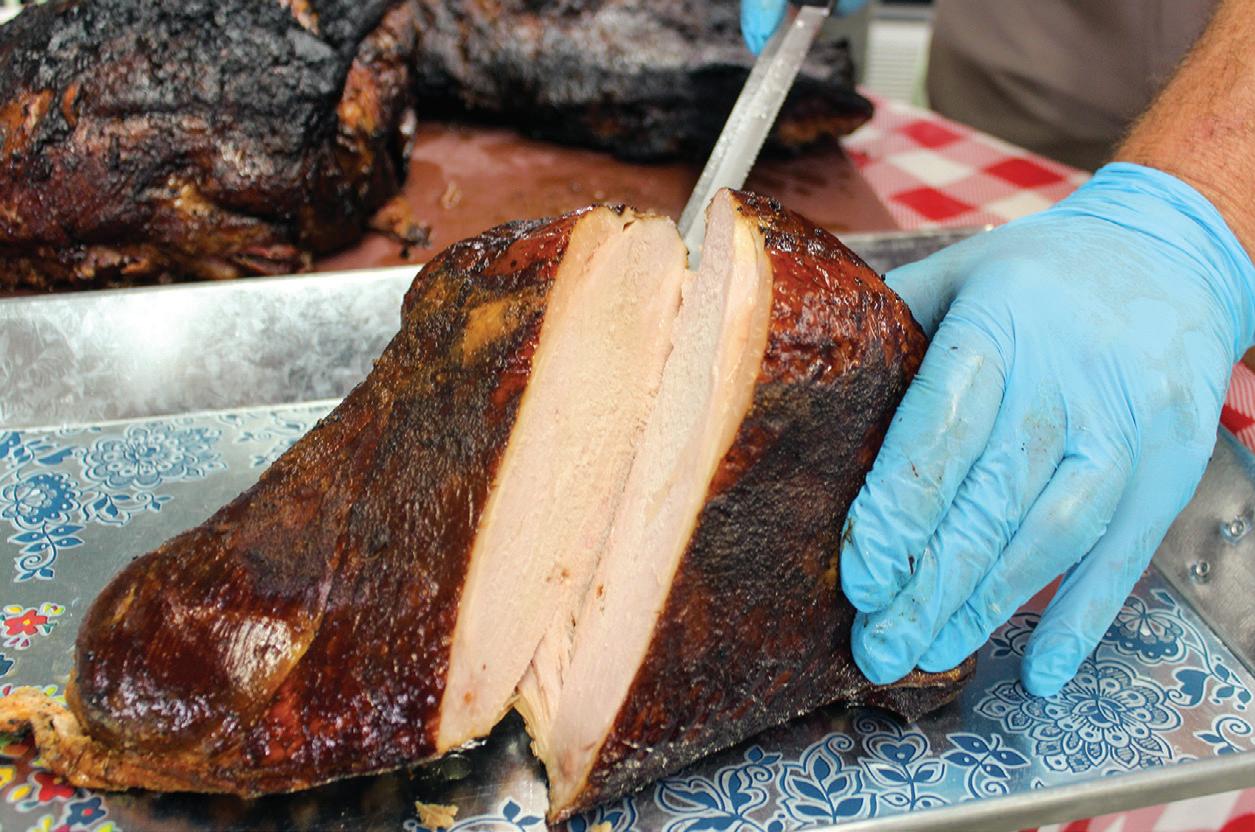
The smoked turkey breast at Ingram’s is moist and flavorful.
While barbecue and camp stew are favorites, Ingram’s also has a variety of ice cream.
Barbecue nachos, served with either chicken, beef or pork, are one of the best sellers. JoAnne and Mike Ingram, far right, praise the Ingram’s team for always giving each shopper and diner a warm welcome.
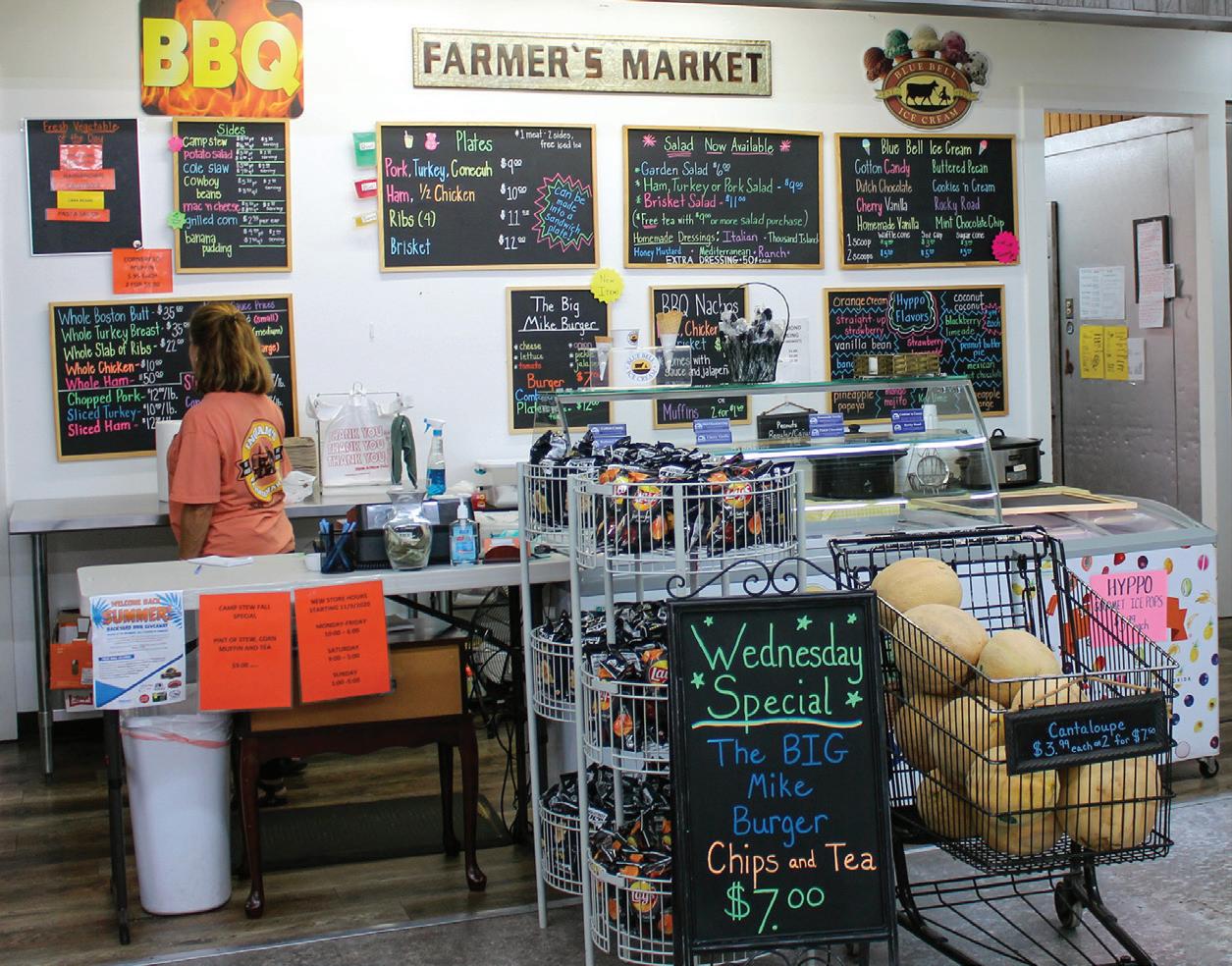
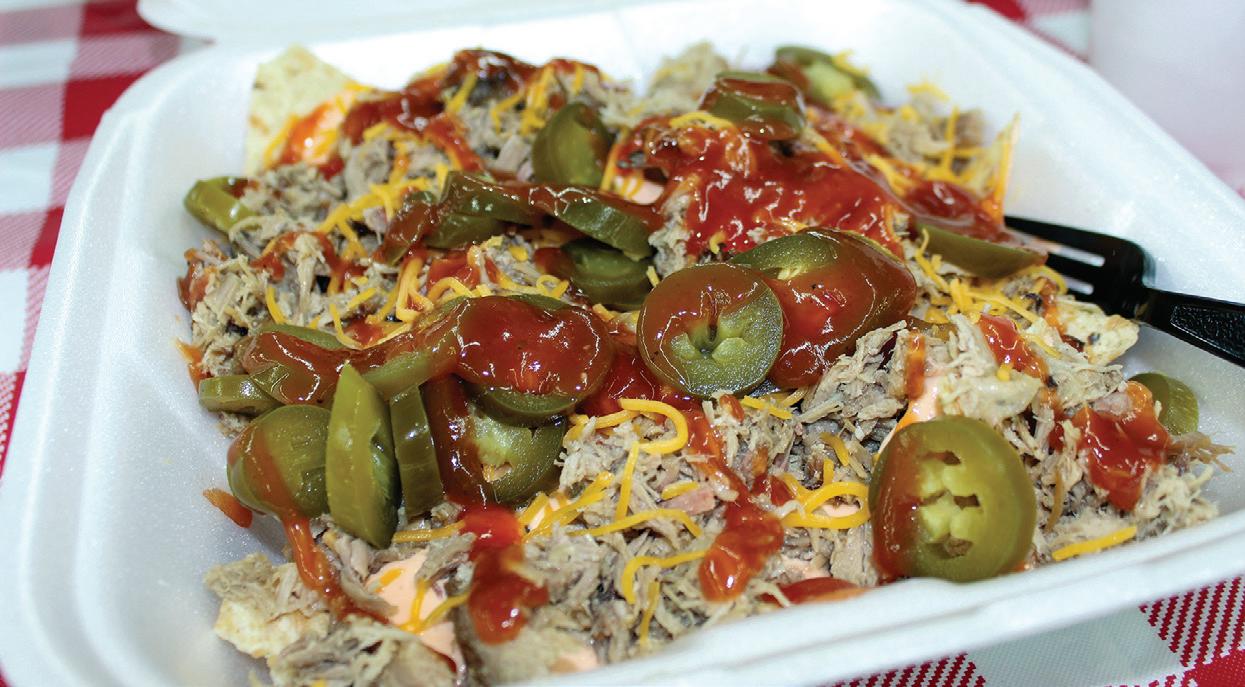
Ingram’s Farmers Market and Garden Center
3740 Magnolia Drive Millbrook, AL 36054 334-517-4682 Hours: 10 a.m. to 6 p.m. Monday-Friday; 9 a.m. to 5 p.m. Saturday; closed on Sundays Search for the restaurant on Facebook
Millbrook (almost like whipped potatoes), with just the right crunch from small-diced pickles, are recipes from JoAnne’s family. And the main attractions — the barbecue and camp stew — are made by Mike with the same ingredients and methods he’s been using for years.
His pork butts (which, when done, are chopped, not pulled) are bathed in a thin seasoned liquid he calls “JuJu sauce” before being wrapped in foil and cooked for a couple of hours over local oak and hickory smoke. They’re then uncovered and cooked a few hours more. “It’s a bit unorthodox to cover it for a time, but people like the result,” Mike says. Turkey breasts are smoked for six hours, and St. Louis-style ribs get smoked little more than four hours. Beef brisket, with a superior smoke ring, and favorites like Conecuh sausage are on the menu too. Mike’s barbecue sauce is a vinegar-heavy concoction first created by his dad.
Every ounce of meat on offer is meltingly tender and flavorful, even sans sauce. The barbecue nachos — tortilla chips smothered in a creamy, spicy sauce, topped with your choice of barbecue beef, chicken or pork, studded with pickled jalapenos and then sprinkled with shredded cheese — are extremely popular. So is a new item: the Big Mike Burger, a three-quarter pound beast of a beef patty that’s smoked for an hour before sliding between a bun.
The camp stew is so sought after, Mike makes it in 80-quart batches, and Ingram’s sells 120-140 quarts each week. And for folks who are on the move, the barbecue, camp stew and sides are available in large quantities to go.
Despite not being a certainty in the original plan, food is now an essential piece of Ingram’s business. Produce and plants are seasonal, but people come year-round for a great meal served by friendly folks. “We cook here like we’re cooking for our own family,” JoAnne says. “And we often hear, ‘I’ve not had anything here that’s not good.’ That’s a big compliment.”
The warm welcome draws rave reviews and repeat customers, too. “We’ve got lots of regulars, and that’s created a real community spirit here,” says JoAnne. The couple gives their staff credit for the hospitality, praising their constant good attitude. “We have great employees,” Mike says. “We all greet every customer that comes through the door, and people like that personal attention. I think that has built our business as much as anything else.” That and Mike’s careful consideration of the details. “I see almost every piece of meat that comes in and goes out of here,” he says.
So far, the love they put into the business is being returned. According to JoAnne, it’s a real pick-up on the longer days. “We get tired, but not a day goes by without at least one person telling us they appreciate us being here,” she says. “That puts the pep back in your step!”
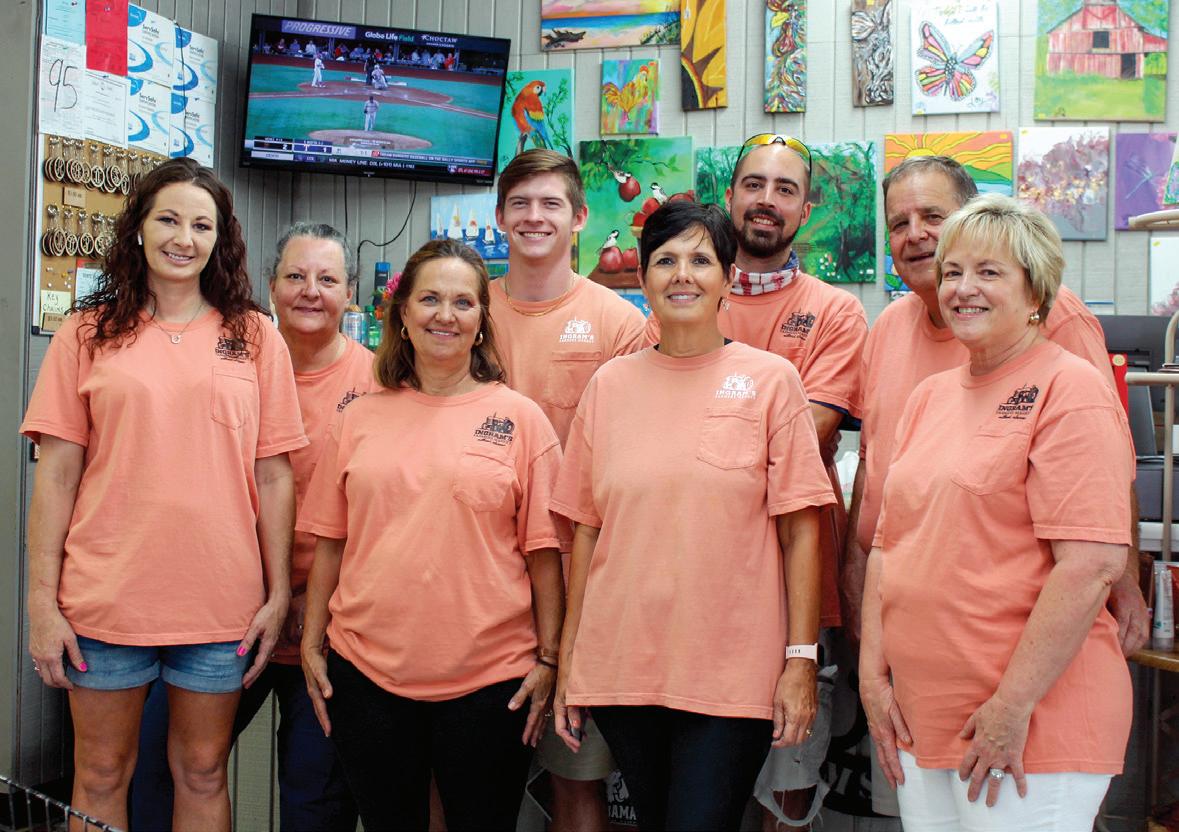

Figs
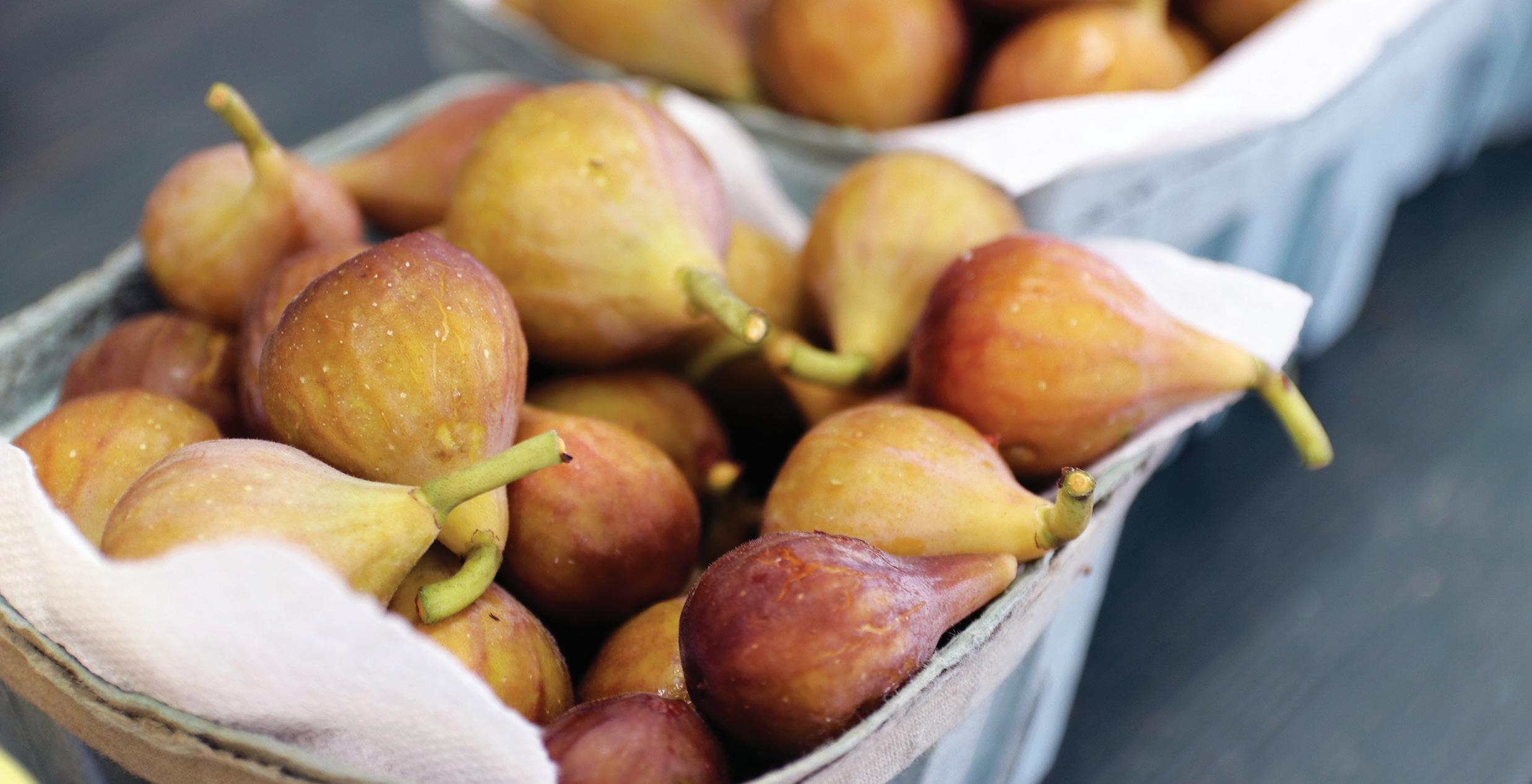
Summer’s most coveted fruit
It’s fig season, that brief and glorious time of year when we get to enjoy one of the most local fruits of summer.
Actually, figs aren’t truly “local.” They are among some 800 plant species within the genus Ficus that are found in tropical and temperate regions across the globe. Many of these species are used for landscaping and as houseplants (weeping figs, rubber trees and creeping fig vine), others for things like rubber production and still others for just plain eating.
Edible figs are native to the Mediterranean and southwestern Asia where they were revered and cultivated for eons before they were introduced into other parts of the world, arriving in the U.S. as early as the 1500s. Today, edible figs are classified as four types — caprifigs, Smyrna, San Pedro and common — all of which play a part in the fig industry.
Of these, it’s the common fig that grows in most backyards and gardens. That’s because common figs, unlike the other three types, don’t require pollination to set fruit, making them perfect for home production. And some 800-plus named varieties of common figs are available to home gardeners, each producing fruit with its own unique tastes, textures and colors.
A fig’s fruit, known as a syconium, isn’t really a true fruit. It’s a pear- or teardrop-shaped cluster of tiny flowers and seeds wrapped snugly together within a thin outer skin. Depending on the variety, those skins may ripen into hues of greens, yellows, browns, blacks and purples, and the inner pulp may range from pale white to pink to deep tones of garnet and ruby.
But getting your hands on those little jewels requires perfect timing because, unlike most fruits, figs don’t continue to ripen after they’re picked so they must be harvested at the height of their maturity, which sometimes means twice a day. Once picked, ripe figs are too soft and fragile to ship and don’t last long even under refrigeration.
All that means that, to enjoy truly great fresh figs you have to get them locally and be prepared to immerse yourself in their goodness. While figs can be preserved by freezing, drying and canning, their flavor is best when eaten right off the tree or used fresh in dishes such as appetizers, salads, pizzas, main and side courses, sauces, fresh relishes and salsas and desserts.
If you’re lucky enough to pick your own figs this year, go for ones that are drooping from the stem and soft to the touch, but watch out for the sap, which contains enzymes that can irritate skin and sometime causes lips and tongues to tingle. If the sap bothers you, wear gloves while picking and make sure to wash figs before eating them raw.
Can’t find a source of fresh figs locally? Plant one of your own! Maybe even several different varieties. Fig trees can grow up to 30 feet high and wide but can be pruned to fit small spaces and can also be grown in containers. They need plenty of sunlight (around 8 hours a day) and prefer a well-drained and loamy soil with a soil pH around 6.0 but can tolerate a variety of soil types.
Fig trees usually take three to five years to bear fruit, and the first few crop yields may not be prolific, but it will steadily improve. Once established, figs are low maintenance. They need little pruning, are drought tolerant and have relatively few pest problems (mainly nematodes, borers and rust diseases). They appreciate a light dose of compost, manure or a balanced fertilizer a couple of times of year (though avoid doing it late in the growing season so you don’t promote new growth that can be damaged by freezing temperatures).
Lots more information about figs is available online including the Alabama Cooperative Extension System’s Fig Production Guide (ANR-1145; available online at aces.edu). Or get advice from fig-growing friends, your local Extension office and from nurseries that specialize in home fruit production.
Katie Jackson is a freelance writer and editor based in Opelika, Alabama. Contact her at katielamarjackson@gmail.com.
AUGUST TIPS
• Sow seed for lettuces and other leafy greens and for fall vegetable crops. • Stay cool and hydrated in the August heat. • Watch for insect and disease problems. • Clean out dead or fading vegetable plants. • Harvest and preserve the last of summer’s produce and herbs. • Water new plantings, lawns and container plants when needed. • Keep bird feeders and baths clean and filled.
For generations to come
The importance of creating intentional legacies for your family
If asked “what are your family’s strongest traditions?” most of us could quickly list several important traditions. They may include recipes, games, repeated stories or holiday customs. Some traditions are the source of others, such as an annual trip to the grandparents, time spent at a family cabin, or hunting or working your land together. All of these provide a sense of both community and identity for family members.
How tradition becomes a legacy
The most important traditions also pass down the values of your family. These traditions are more than fun memories. They shape the lives of younger generations; they define character; they impact futures. In a word, they become legacies.
A tradition of working together on the family farm becomes a legacy of a strong work ethic. A tradition of gardening, canning and cooking becomes a legacy of home-cooked family meals throughout the year, not just at holidays. Early morning fishing trips become a legacy of conservation and love for the outdoors. Your legacy will influence how your children or grandchildren live their lives and how they’ll raise their children to live theirs. Given the importance of a legacy, you should take intentional steps to encourage it.
Questions to help create an intentional legacy
What are your family’s traditions? What are your family’s legacies?
What memories of your parents and grandparents do you have? What traditions did you enjoy then that you do with your family now? Also, ask your children and grandchildren what they view as traditions. Then ask, “What is the legacy my family is gaining from this tradition?”
How can you encourage the traditions and legacies you have?
This is the intentionality part of building an intentional legacy. Cementing a legacy requires planning for extra time together. Pass on your family’s recipes and then plan a few extra times a year to cook them together. Add another weekend or two at the cabin each year.
What else do you need to do?
Some legacies require more than just keeping traditions. If you have land, a lake house, or a farm that’s part of your traditions, keep it in the family by working with a financial advisor, a lawyer, and your insurance agent. They can help you address any tax or financial issues to keep them for the next generation. If you want to provide either an educational or financial legacy for your family, different financial and insurance strategies can help fund those goals while reducing tax issues.
ARECU is always ready to help you accomplish your financial goals for yourself and your family, including building legacies. Call us at (800) 381-7328 to learn more.

Bama in a Box:
Subscription service helps small businesses
By Tessa Battles
When small businesses in Alabama began closing their doors due to the pandemic, Angi Horn Stalnaker, owner of Virtus Solutions in Troy, took notice. She and Office Manager Laney Kelley also noted a push for consumers to buy more American-made products. She combined these observations and by June, Bama in a Box, a subscription service filled with Alabama-made items, was born.
“We wanted to buy American, but further than that, we wanted to buy local from Alabama,” says Stalnaker. “The more we researched, the more we realized that literally almost everything you use every day can be bought from a company that makes it in Alabama.”
Amy Jinright, owner of Southern Scents and Sensations in Troy, says that if it had not been for Bama in a Box, her business might not be here today.
Jinright opened Southern Scents and Sensations 16 years ago, but has only been in her building in Troy for two years. She started the business by making candles, but later moved on to soaps and lotions. Selftaught, she started by selling products out of the back of her car.
“I’d go to the different businesses where I might know one or two people that worked there,” says Jinright. “And then I would go in and all of the women would come out and shop at the back of my car.”
When she opened her business in downtown Troy two years ago, she had no idea that the COVID-19 pandemic would end up shutting her doors. She was left with a few wholesale customers, special orders and regular customers. Then Stalnaker reached out to her about participating in Bama in a Box.
“Our goal was to sell 50 boxes,” Stalnaker says. “That was a year ago and now we have sold thousands of boxes all over the world.”
Bama in a Box not only includes seven items made in Alabama, but information about each business so customers can reach out to them if they want to buy again. Jinright’s bath bomb was in the first Bama in a Box. She soon began getting Facebook messages from all over the country. “I met these people this weekend that were from Alaska,” says Jinright. “They’re actually from Alabama and someone had sent them a Bama in a Box. She told me what was in her box and I said ‘Well that’s my bath bomb.’” Stalnaker says boxes have been sent to Connecticut, Hawaii, Maine, Delaware, Michigan and Korea. Johnson Labs in Troy provides dishwashing detergents, hand sanitizer and disinfectants. Unlike other businesses, Johnson Labs saw sales increase during COVID because of their products. “There was a sudden drop off the next year and because we had an increase the previous year we didn’t qualify for some of the PPP loans,” says Karla Johnson, CEO of Johnson Labs. “Then we had a sudden shutdown because of supply issues and things like that.” Johnson heard about Bama in a Box on the news Bama In a Box offers treats that the whole family can enjoy. and says she doesn’t remember who reached out first, but that it is a “happy marriage.” “It’s helping us grow that retail customer demographic that we have not had,” says Johnson. “It has done a lot for us to help get our names out there and have a little more recognition.” Soaps, snacks, sauces, syrups and much more can be found in the boxes. The only things you won’t find are perishable items, like vegetables. Over 500 high-quality products from Alabama are included in Stalnaker’s inventory. For either a month-to-month ($39.95) or three-month subscription ($104), a box of products made in Alabama will be
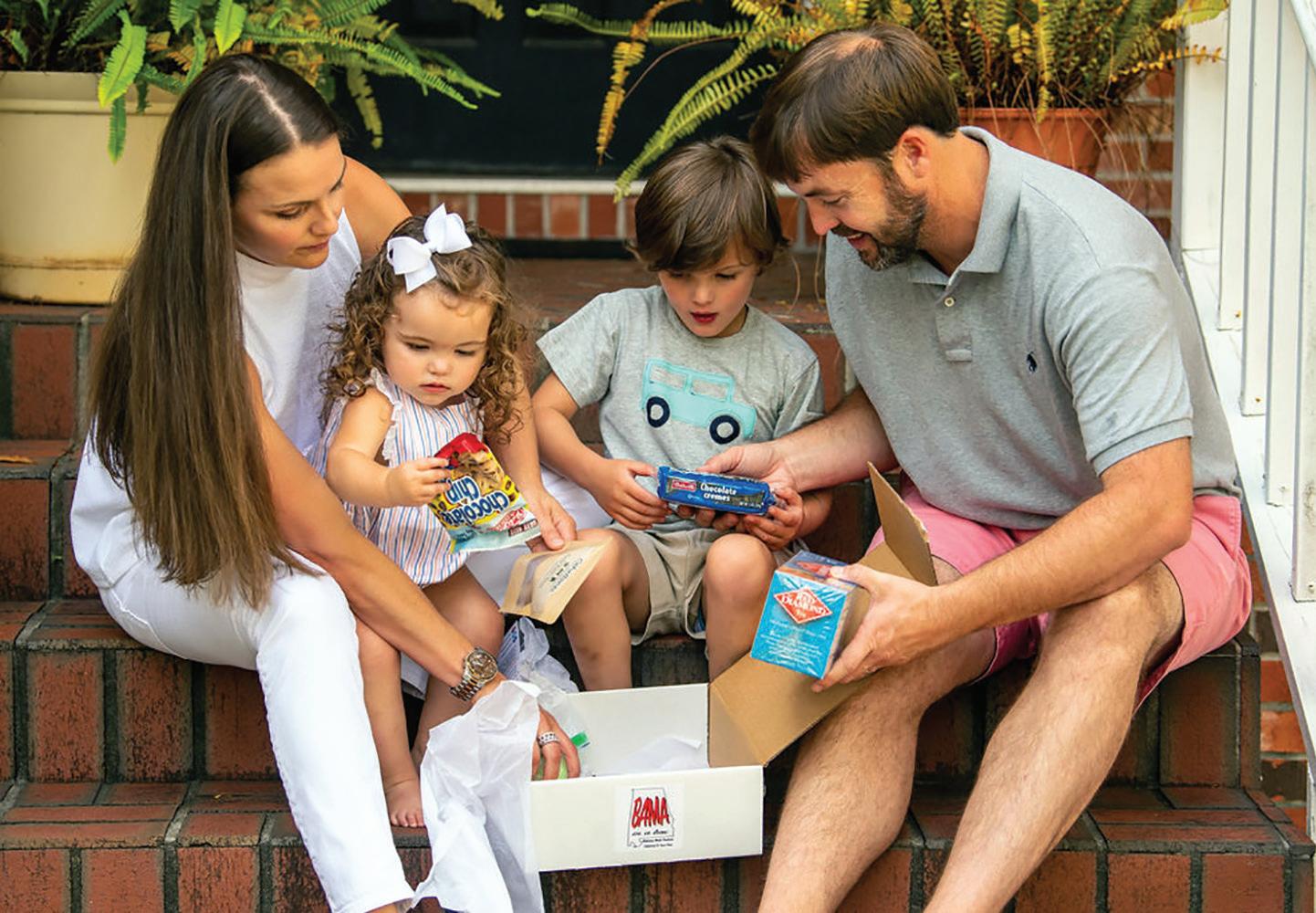
shipped to your doorstep monthly. The included products change each month, so you never get the same box twice. You can also order one-time specialty boxes, such as a grilling kit, breakfast in a box, ultimate Alabama gift box, coffee sampler, bath in a box, and the Bama snack pack. Boxes for Mother’s Day, Father’s Day and Christmas are available.
“You’ve never seen Amazon on the back of your kid’s little league jersey,” says Stalnaker. “You should buy things from inside Alabama if you can because you’re helping yourself.
You’re helping your schools, textbooks, roads, bridges and community.” For more information visit bamainabox.com.
Over 500 products are made in Alabama and 5-7 are included in each box.
PHOTOS COURTESY BAMA IN A BOX
